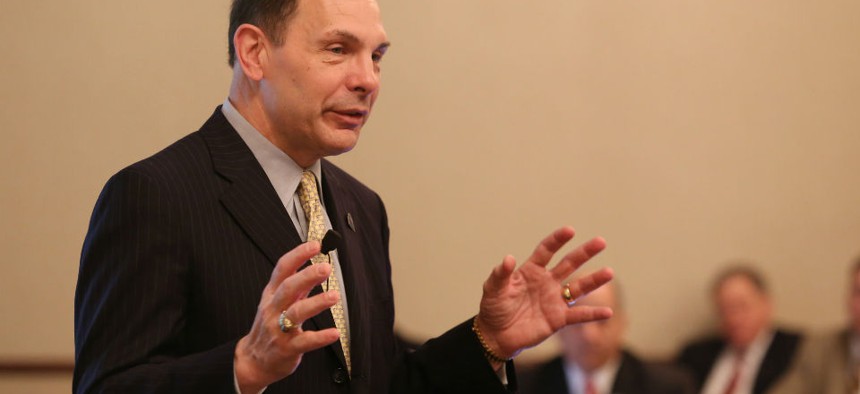
VA Secretary Bob McDonald. Reynaldo Leal/Veterans Affairs Department
VA Employees Say They Are ‘Prisoners of a System’ They Can’t Change
‘Secretary Bob’ looks to add staff, reduce infrastructure and allow more private care.
Veterans Affairs Secretary Bob McDonald at a congressional hearing Wednesday laid out a vision for the future of his department that includes far fewer VA facilities and a more “hybrid” approach to veterans health care that will involve both public and private resources.
McDonald trumpeted the buzzword of reform through the House Appropriations VA subcommittee hearing, and his prescriptions were met with tempered approval from lawmakers in both parties. The man known as “Secretary Bob” emphasized the need to get rid of aging and little-used facilities, while vowing to expand upon a recent legislative effort to give more veterans access to private care.
The secretary’s calls for change were so significant one lawmaker -- Rep. Sam Farr, D-Calif. -- said McDonald’s opening statement included more reform suggestions than he had “ever heard from a secretary in any department.”
McDonald asked Congress to take a look at VA’s physical infrastructure, noting 900 of its facilities are more than 90 years old and 1,300 are more than 70 years old. More than 330 facilities are more than half vacant. VA can save about $24 million annually on maintenance costs by closing those mostly empty buildings, McDonald said.
Lawmakers also were interested in the Veterans Access, Choice and Accountability Act, which they passed in the last congressional session. In recent weeks, efforts to boost both accountability and access to care have come under fire. McDonald said that while relatively few eligible veterans are opting to use their private-access health care cards, it is still too soon to measure the full impact of the new law.
“There’s a high degree of uncertainty,” McDonald said, “as there is with any free market with choice.” He added various estimates anticipate the agency will spend between $4 billion and $13 billion over the next three years. He also said he would like to work with Congress to ensure he has flexibility in enforcing the law to rope in more participants, including the possibility of reducing the 40-mile boundary.
McDonald warned against contracting out VA services, but said he thinks there “will be a hybrid system in the future.” He added VA had seen a 48 percent increase in awarding private care before the 2014 access law was passed.
On the staffing front, McDonald said the agency still must add 4,000 physicians and 10,000 nurses to its rolls. Much of the funding for those increases was provided in the 2014 reform law. Since the secretary took over last year, VA has hired 900 new doctors and more than 1,000 nurses. McDonald noted VA has raised pay bands for physicians -- which has helped fill vacancies -- but the perception that “VA is a terrible place to work” remains a larger issue. The secretary has held town hall meetings across the country with VA staff, where employees told him they were “prisoners of a system they couldn’t change.”
Since his nomination, McDonald has emphasized the need to provide better customer service to veterans. He asked Congress to give him the flexibility typically afforded to private-sector leaders so he can attack the problems VA faces more fluidly. He expressed his desire to apply that mentality to rank-and-file personnel as well: “This is your VA too and you can change it,” McDonald said he has told employees.
To help advance those efforts, McDonald has embraced union leadership. American Federation of Government Employees National President J. David Cox has praised the regime of the new secretary, applauding its responsiveness to the union’s concerns.
McDonald has labeled his proposals under the umbrella of MyVA, which includes centralizing VA outposts into five regions. He said his changes are not intended to be a “time-bound exercise,” but he expects them to occur within the next couple of years. The overhaul won’t happen overnight, he said, but the payout will make the wait worthwhile.
“My reforms will take time,” McDonald told the panel. “But over the long term they will enable VA to better provide to veterans the services they earned.”







